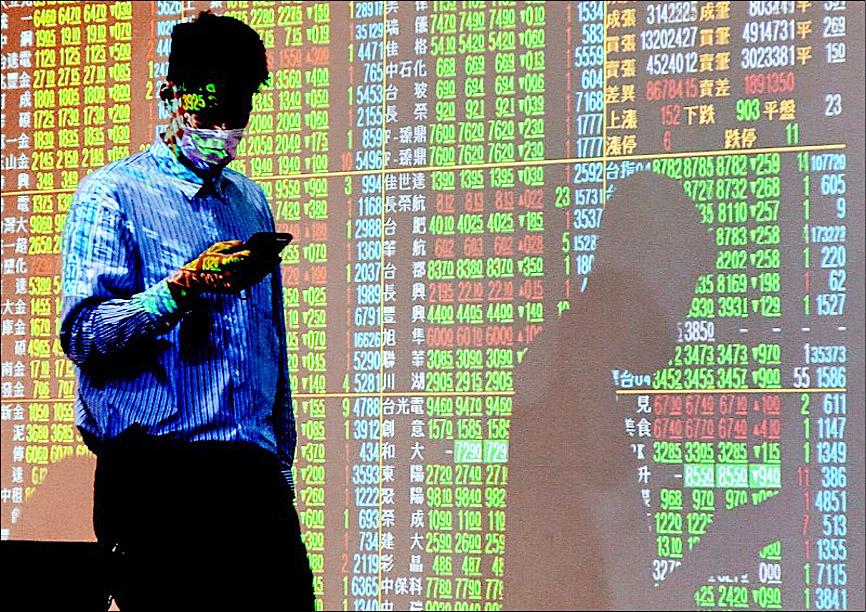The TAIEX yesterday bounced back to close 0.89 percent higher at 14,464.53 points, after news that former Japanese prime minister Shinzo Abe had been shot at a political campaign event sent the market tumbling in intraday trading, Taiwan Stock Exchange (TWSE) data showed.
The TAIEX joined other Asian stocks falling in afternoon trading after Abe’s assassination erased gains made earlier yesterday, the exchanges’ data showed.
Japan’s benchmark Nikkei 225 closed up 0.1 percent, Hong Kong’s Hang Seng Index closed up 0.38 percent, South Korea’s KOSPI rose 0.7 percent and Singapore’s Straits Times Index edged up 0.06 percent, while the Shanghai Composite Index shed 0.25 percent, the data showed.

Photo: Chien Li-chung, Taipei Times
Turnover on the TAIEX was NT$257.3 billion (US$8.64 billion), as foreign institutional investors sold a net NT$3.93 billion of local shares, the third-largest this week, TWSE data showed.
Despite the TAIEX’s earlier retreat, contract chipmaker Taiwan Semiconductor Manufacturing Co (台積電) ended the day 2.08 percent higher at NT$467 on turnover of NT$18.25 billion, making it the heaviest traded stock yesterday, TWSE data showed.
Evergreen Marine Corp (長榮海運) followed with NT$16.23 billion in transactions. The shipper’s share price rose 4.86 percent to NT$92.7, supported by a record-high revenue of NT$60 billion last month, the data showed.
SinoPac Securities Investment Service Corp (永豐投顧) said in a research note that it expects the TAIEX to rebound gradually after tumbling 18 percent over the past five months.
Citing historical trends, the investment consultancy said there was little likelihood — about 10 percent — that the TAIEX would enter a bear market, or a fall of 20 percent from a recent peak.
“US and world inflation is the main factor affecting global stock markets. The market’s takeaway from the US’ latest inflation figure, which is to be released on Wednesday next week, will be crucial,” SinoPac Securities Investment said in the research note.
Foreign institutional investors have been net sellers for five consecutive weeks, but the amount of their net selling narrowed this week, PGIM Securities Investment Trust Enterprise Co (PGIM, 保德信投信) said in a note.
Local institutional investors have a higher confidence in the local market than foreign investors, PGIM said, citing their net purchases of local shares for three weeks in a row.
They bought a net NT$10.3 billion of local shares this week, the second highest in a single week this year, it said.

TRADE WAR: Tariffs should also apply to any goods that pass through the new Beijing-funded port in Chancay, Peru, an adviser to US president-elect Donald Trump said A veteran adviser to US president-elect Donald Trump is proposing that the 60 percent tariffs that Trump vowed to impose on Chinese goods also apply to goods from any country that pass through a new port that Beijing has built in Peru. The duties should apply to goods from China or countries in South America that pass through the new deep-water port Chancay, a town 60km north of Lima, said Mauricio Claver-Carone, an adviser to the Trump transition team who served as senior director for the western hemisphere on the White House National Security Council in his first administration. “Any product going

STRUGGLING BUSINESS: South Korea’s biggest company and semiconductor manufacturer’s buyback fuels concerns that it could be missing out on the AI boom Samsung Electronics Co plans to buy back about 10 trillion won (US$7.2 billion) of its own stock over the next year, putting in motion one of the larger shareholder return programs in its history. South Korea’s biggest company would repurchase the stock in stages over the coming 12 months, it said in a regulatory filing on Friday. As a first step, it would buy back about 3 trillion won of paper starting today up until February next year, all of which it would cancel. The board would deliberate on how best to effect the remaining 7 trillion won of buybacks. The move

China’s Huawei Technologies Co (華為) plans to start mass-producing its most advanced artificial intelligence (AI) chip in the first quarter of next year, even as it struggles to make enough chips due to US restrictions, two people familiar with the matter said. The telecoms conglomerate has sent samples of the Ascend 910C — its newest chip, meant to rival those made by US chipmaker Nvidia Corp — to some technology firms and started taking orders, the sources told Reuters. The 910C is being made by top Chinese contract chipmaker Semiconductor Manufacturing International Corp (SMIC, 中芯) on its N+2 process, but a lack

NVIDIA PLATFORM: Hon Hai’s Mexican facility is to begin production early next year and a Taiwan site is to enter production next month, Nvidia wrote on its blog Hon Hai Precision Industry Co (鴻海精密), the world’s biggest electronics manufacturer, yesterday said it is expanding production capacity of artificial intelligence (AI) servers based on Nvidia Corp’s Blackwell chips in Taiwan, the US and Mexico to cope with rising demand. Hon Hai’s new AI-enabled factories are to use Nvidia’s Omnivores platform to create 3D digital twins to plan and simulate automated production lines at a factory in Hsinchu, the company said in a statement. Nvidia’s Omnivores platform is for developing industrial AI simulation applications and helps bring facilities online faster. Hon Hai’s Mexican facility is to begin production early next year and the